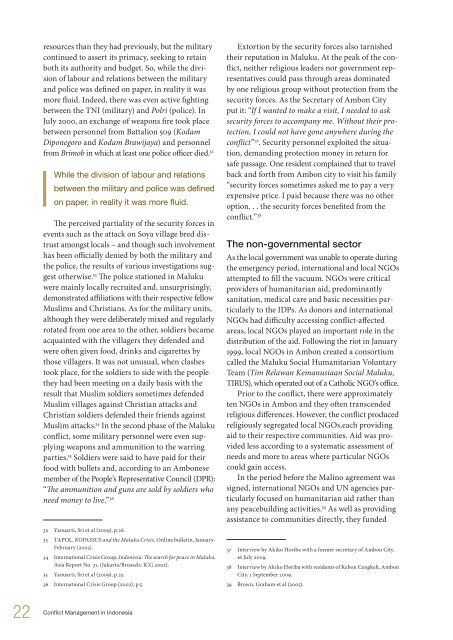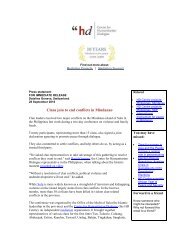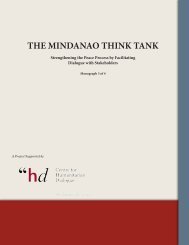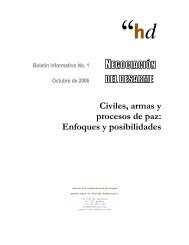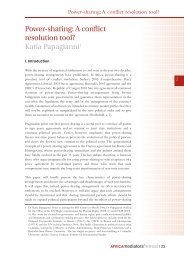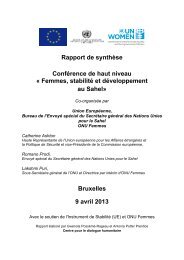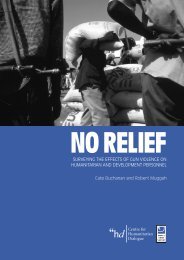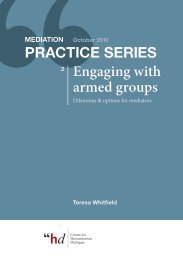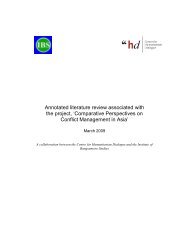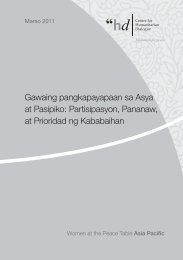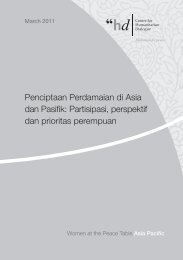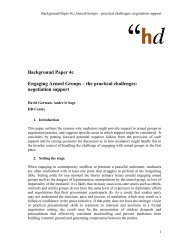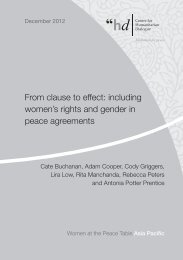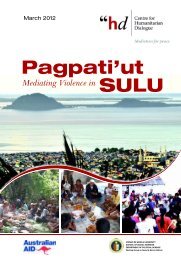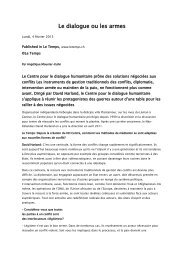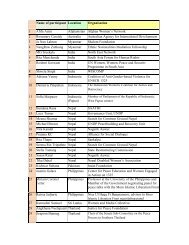Conflict Management in Indonesia â An Analysis of the Conflicts in ...
Conflict Management in Indonesia â An Analysis of the Conflicts in ...
Conflict Management in Indonesia â An Analysis of the Conflicts in ...
Create successful ePaper yourself
Turn your PDF publications into a flip-book with our unique Google optimized e-Paper software.
esources than <strong>the</strong>y had previously, but <strong>the</strong> military<br />
cont<strong>in</strong>ued to assert its primacy, seek<strong>in</strong>g to reta<strong>in</strong><br />
both its authority and budget. So, while <strong>the</strong> division<br />
<strong>of</strong> labour and relations between <strong>the</strong> military<br />
and police was def<strong>in</strong>ed on paper, <strong>in</strong> reality it was<br />
more fluid. Indeed, <strong>the</strong>re was even active fight<strong>in</strong>g<br />
between <strong>the</strong> TNI (military) and Polri (police). In<br />
July 2000, an exchange <strong>of</strong> weapons fire took place<br />
between personnel from Battalion 509 (Kodam<br />
Diponegoro and Kodam Brawijaya) and personnel<br />
from Brimob <strong>in</strong> which at least one police <strong>of</strong>ficer died. 32<br />
While <strong>the</strong> division <strong>of</strong> labour and relations<br />
between <strong>the</strong> military and police was def<strong>in</strong>ed<br />
on paper, <strong>in</strong> reality it was more fluid.<br />
The perceived partiality <strong>of</strong> <strong>the</strong> security forces <strong>in</strong><br />
events such as <strong>the</strong> attack on Soya village bred distrust<br />
amongst locals – and though such <strong>in</strong>volvement<br />
has been <strong>of</strong>ficially denied by both <strong>the</strong> military and<br />
<strong>the</strong> police, <strong>the</strong> results <strong>of</strong> various <strong>in</strong>vestigations suggest<br />
o<strong>the</strong>rwise. 33 The police stationed <strong>in</strong> Maluku<br />
were ma<strong>in</strong>ly locally recruited and, unsurpris<strong>in</strong>gly,<br />
demonstrated affiliations with <strong>the</strong>ir respective fellow<br />
Muslims and Christians. As for <strong>the</strong> military units,<br />
although <strong>the</strong>y were deliberately mixed and regularly<br />
rotated from one area to <strong>the</strong> o<strong>the</strong>r, soldiers became<br />
acqua<strong>in</strong>ted with <strong>the</strong> villagers <strong>the</strong>y defended and<br />
were <strong>of</strong>ten given food, dr<strong>in</strong>ks and cigarettes by<br />
those villagers. It was not unusual, when clashes<br />
took place, for <strong>the</strong> soldiers to side with <strong>the</strong> people<br />
<strong>the</strong>y had been meet<strong>in</strong>g on a daily basis with <strong>the</strong><br />
result that Muslim soldiers sometimes defended<br />
Muslim villages aga<strong>in</strong>st Christian attacks and<br />
Christian soldiers defended <strong>the</strong>ir friends aga<strong>in</strong>st<br />
Muslim attacks. 34 In <strong>the</strong> second phase <strong>of</strong> <strong>the</strong> Maluku<br />
conflict, some military personnel were even supply<strong>in</strong>g<br />
weapons and ammunition to <strong>the</strong> warr<strong>in</strong>g<br />
parties. 35 Soldiers were said to have paid for <strong>the</strong>ir<br />
food with bullets and, accord<strong>in</strong>g to an Ambonese<br />
member <strong>of</strong> <strong>the</strong> People’s Representative Council (DPR):<br />
“The ammunition and guns are sold by soldiers who<br />
need money to live.” 36<br />
32 Yanuarti, Sri et al (2009), p.26.<br />
33 TAPOL, KOPASSUS and <strong>the</strong> Maluku Crisis, Onl<strong>in</strong>e bullet<strong>in</strong>, January-<br />
February (2003).<br />
34 International Crisis Group, <strong>Indonesia</strong>: The search for peace <strong>in</strong> Maluku,<br />
Asia Report No. 31, (Jakarta/Brussels: ICG 2002).<br />
35 Yanuarti, Sri et al (2009), p.25.<br />
36 International Crisis Group (2002), p.5.<br />
Extortion by <strong>the</strong> security forces also tarnished<br />
<strong>the</strong>ir reputation <strong>in</strong> Maluku. At <strong>the</strong> peak <strong>of</strong> <strong>the</strong> conflict,<br />
nei<strong>the</strong>r religious leaders nor government representatives<br />
could pass through areas dom<strong>in</strong>ated<br />
by one religious group without protection from <strong>the</strong><br />
security forces. As <strong>the</strong> Secretary <strong>of</strong> Ambon City<br />
put it: “If I wanted to make a visit, I needed to ask<br />
security forces to accompany me. Without <strong>the</strong>ir protection,<br />
I could not have gone anywhere dur<strong>in</strong>g <strong>the</strong><br />
conflict” 37 . Security personnel exploited <strong>the</strong> situation,<br />
demand<strong>in</strong>g protection money <strong>in</strong> return for<br />
safe passage. One resident compla<strong>in</strong>ed that to travel<br />
back and forth from Ambon city to visit his family<br />
“security forces sometimes asked me to pay a very<br />
expensive price. I paid because <strong>the</strong>re was no o<strong>the</strong>r<br />
option. . . <strong>the</strong> security forces benefited from <strong>the</strong><br />
conflict.” 38<br />
The non-governmental sector<br />
As <strong>the</strong> local government was unable to operate dur<strong>in</strong>g<br />
<strong>the</strong> emergency period, <strong>in</strong>ternational and local NGOs<br />
attempted to fill <strong>the</strong> vacuum. NGOs were critical<br />
providers <strong>of</strong> humanitarian aid, predom<strong>in</strong>antly<br />
sanitation, medical care and basic necessities particularly<br />
to <strong>the</strong> IDPs. As donors and <strong>in</strong>ternational<br />
NGOs had difficulty access<strong>in</strong>g conflict-affected<br />
areas, local NGOs played an important role <strong>in</strong> <strong>the</strong><br />
distribution <strong>of</strong> <strong>the</strong> aid. Follow<strong>in</strong>g <strong>the</strong> riot <strong>in</strong> January<br />
1999, local NGOs <strong>in</strong> Ambon created a consortium<br />
called <strong>the</strong> Maluku Social Humanitarian Voluntary<br />
Team (Tim Relawan Kemanusiaan Social Maluku,<br />
TIRUS), which operated out <strong>of</strong> a Catholic NGO’s <strong>of</strong>fice.<br />
Prior to <strong>the</strong> conflict, <strong>the</strong>re were approximately<br />
ten NGOs <strong>in</strong> Ambon and <strong>the</strong>y <strong>of</strong>ten transcended<br />
religious differences. However, <strong>the</strong> conflict produced<br />
religiously segregated local NGOs,each provid<strong>in</strong>g<br />
aid to <strong>the</strong>ir respective communities. Aid was provided<br />
less accord<strong>in</strong>g to a systematic assessment <strong>of</strong><br />
needs and more to areas where particular NGOs<br />
could ga<strong>in</strong> access.<br />
In <strong>the</strong> period before <strong>the</strong> Mal<strong>in</strong>o agreement was<br />
signed, <strong>in</strong>ternational NGOs and UN agencies particularly<br />
focused on humanitarian aid ra<strong>the</strong>r than<br />
any peacebuild<strong>in</strong>g activities. 39 As well as provid<strong>in</strong>g<br />
assistance to communities directly, <strong>the</strong>y funded<br />
37 Interview by Akiko Horiba with a former secretary <strong>of</strong> Ambon City,<br />
16 July 2009.<br />
38 Interview by Akiko Horiba with residents <strong>of</strong> Kebon Cengkeh, Ambon<br />
City, 1 September 2009.<br />
39 Brown, Graham et al (2005).<br />
22<br />
<strong>Conflict</strong> <strong>Management</strong> <strong>in</strong> <strong>Indonesia</strong>


